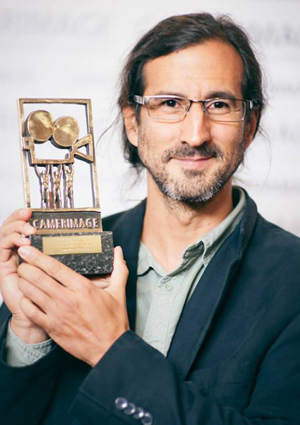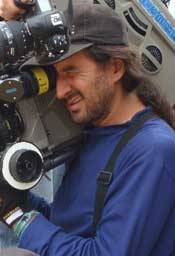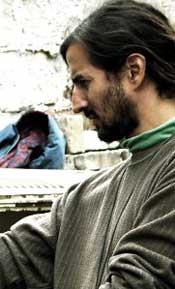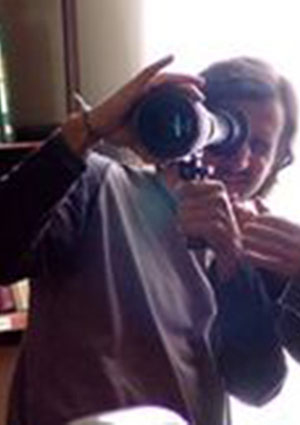Director of photography, Camera, Camera assistant, Gaffer, Otros
Mauricio Vidal
mauriciovidal.net
Vidal received a Special Mention at the Camerimage International Film Festival, the premier festival in the world dedicated to the best of the art of cinematography
Mauricio Vidal was born in Ibague, Colombia in 1969. He carried out his training as Director of Photography in a host of countries, from Canada to Japan, passing through Argentina, Brazil, the U.S., and Poland. One of his most recent works, Monte Adentro by Nicholás Macario, was awarded the Special Jury Mention in the Feature Length Documentary Films Competition at the Camerimage International Film Festival, the premier festival in the world dedicated to the best of the art of cinematography.
Vidal studied Social Communication at the Universidad Externado de Colombia and has completed photography workshops at Algonquin College (Ottawa, Canada, 1988), Tiffen Tech Center (Los Angeles, USA, 1995), Film International Workshops (Maine, USA, 2001), a documentary production workshop at the Okinawa International Center (Okinawa, Japan, 1993), and a post-production workshop at Metrovisión and Cinecolor (Buenos Aires, Argentina, 1998). In 2004, after working as camera operator for El Colombian Dream by Felipe Aljure, he attended the Camerimage Festival in Lodz, Poland, where he took part in several workshops and seminars with highly respected cinematographers such as Michael Chapman (Taxi Driver), Rodrigo Prieto (Babel), Christopher Doyle (Paranoid Park), Phedon Papamichael (The Million Dollar Hotel), and Javier Aguierresarobe (The Sea Inside). He then traveled to Argentina to complete an internship with Laboratorio Cinecolor under the supervision of the colorist Alberto Acevedo (The Crime of Father Amaro).
As a teacher, Vidal has taught numerous workshops, seminars and lectures at institutions such as LaSalle College in Bogota; Universidad Javeriana; Universidad Autonoma in Bucaramanga; Universidad de los Andes; the Yuri Mundi Community Organization (in the 20 Julio neighborhood); and the Tecnicine Cinematography Technicians Cooperative. With the Ministry of Culture’s Film Department, he taught editing and cinematography workshops as part of the “Imagining our Image” program, in the cities of Manizales, Pasto, Arauca, San Andres, San Vicente del Caguan, and Leticia. He was also Cinematography Advisor at the International School of Film in San Antonio de los Baños, Cuba in 2007, and is a founding member of the Colombian Association of Directors of Photography (ACDF) and a member of the Digital Cinematography Society.
After finishing his studies, he worked as an editor for several years. He then joined the TV show El Mundo al Vuelo, directed by Héctor Mora, and worked as the gaffer for several short films and the feature film Without Amparo (2005) by Jaime Osorio. He won a training scholarship from the Ibermedia program that allowed him to attend the International Film Workshops in Maine, USA. On his return to Colombia he worked as a cinematographer for commercials and music videos with the company Rhayuela Films, including "Rompecabezas" by Aterciopelados, “Hay un Daño en el Baño" by El Bloque, “Varita Mágica” by Propiedad Privada, “No Se Me Acaba la Sed” by Julio Nava, and “Legal” by Alerta.
Seeking a steady focus for his art, Vidal has made the documentary genre an ongoing theme in his career, with over twenty productions for a range of networks, such as the Discovery Channel, National Geographic, Arte, and more. He has participated in projects such as Rock al Parque ‘97; Crónica de un Baile del Muñeco by Pablo Mora; Mujeres en la Guerra and Huéspedes de la Guerra by Priscila Padilla; El Ciudadano Escobar by Sergio Cabrera; Apaporis, in Search of One River by Antonio Dorado (Selected at IDA Docu Weeks and winner of the 2012 Macondo Prize for Best Cinematography); 47 Horas sin Chávez by Jaime Escallón; Operación Jaque by Juan Rendón; the television program Las Aventuras del Profesor Yarumo; and other projects for institutions such as the Ministry of Culture, the Institute of Anthropology, and Fundación Social.
He has been director of photography for numerous short films, including El Ojo de Dios by Fernando López; La Vuelta de Hoja (2003) and Marina, la Esposa del Pescador (2009) by Carlos Hernández – the latter won him a Special Mention for Cinematography at the Cine Pobre Festival in Cuba and a Santa Lucia award for Best Cinematography at the In Vitro Visual International Festival; Ciudad Crónica by Klych López; ¿De qué Barrio Llama? by Juan Pablo Félix; Hoguera by Andi Baiz; Desayuno con el Suicida by Jaime Escallón; Pelos by Augusto Sandino; Soy una Invención by Edwin Cortés; Un Día con mi Padre by Carlos Mogollón; Artefacto by Daniel Mejía; Gasolina by Pedro “Toto” García; Mimo by Giovanna Hernández; El Dragón de Komodo by José Luís Rugeles; El Circo by Carlos Santa; and Tricolor Fútbol Club by William Vega.
In 2003, he did the cinematography for his first feature film, The Story of the Pink Trunk by Libia Stella Gómez, thus setting out on a career that has led him to participate in major productions such as Satanás by Andi Baiz; La Milagrosa by Mexican director Rafael Lara; the HDV feature film Martinis al Atardecer by Mauricio Iragorri; the medium-length film Quién Paga el Pato, directed by Pablo Mora as part of the multi-feature film Bogotá 2016; the Colombian-Panamanian production Chance (2010) by Abner Benaim; the co-production Contracorriente (Germany, Colombia, France, Peru) by Javier Fuentes-León (2011); Mother, Eat Your Soup by Mario Ribero (2011); The Boss by Jaime Escallon (2012); Bolaetrapo (Balls) (2014) and Carrusel (2012) by Guillermo Iván Dueñas; and most recently The Vanished Elephant by Javier Fuentes-León.
He was also camera operator for García by José Luís Rugeles and El Colombian Dream by Felipe Aljure, and did additional cinematography for Paraíso Travel by Simón Brand. Currently, two of his feature films are in post-production: the feature film Eso que Llaman Amor by Carlos Cesar Arbeláez and Habana Instant by Guillermo Iván Dueñas, filmed entirely with handheld cameras and without lights in East Havana.
He is currently President of the Colombian Association of Directors of Photography (ADFC), a member of IMAGO, and a member of the Digital Cinema Society. Finally, he has sought to share his experiences by giving workshops and courses at venues including the International School of Film in San Antonio de los Baños, Cuba; The National Film School; the Bogota International Documentary Screening; the International Hall of Light (Salón Internacional de la Luz); and the Ministry of Culture’s INI workshops.
Filming
Director of photography
DARK ROOM ()
Director of photography
LA SALSA VIVE (2025)
Director of photography
LA SUPREMA (2024)
Director of photography
ANA ROSA (2024)
Director of photography
Director of photography
When the waters flow as One A women and peace story (2023)
Director of photography
REBELIÓN (2022)
Director of photography
THE BEST FAMILIES (2021)
Director of photography
LA MUJER DE LOS 7 NOMBRES (2018)
Director of photography
Director of photography
KEYLA (2017)
Director of photography
THAT THING CALLED LOVE (2016)
Director of photography
THE VANISHED ELEPHANT (2015)
Director of photography
MONTE ADENTRO (2015)
Director of photography
BOLAETRAPO (2014)
Director of photography
Director of photography
THE BOSS (2011)
Director of photography
MOTHER, EAT YOUR SOUP (2011)
Director of photography
CONTRACORRIENTE (2010)
Director of photography
CHANCE (2010)
Director of photography
MARINA, THE FISHERMAN'S WIFE (2009)
Director of photography
LA MILAGROSA (2008)
Director of photography
MIMO (2008)
Director of photography
HOGUERA (2007)
Director of photography
EL DRAGÓN DE KOMODO (2007)
Director of photography
SATANÁS (2007)
Director of photography
SOY UNA INVENCION (2007)
Director of photography
CIUDAD CRÓNICA (2006)
Director of photography
Director of photography
PELOS (2005)
Director of photography
THE STORY OF THE PINK TRUNK (2005)
Director of photography
LA VUELTA DE HOJA (2003)
Director of photography
¿DE QUÉ BARRIO LLAMA? (2003)
Director of photography
BOGOTÁ 2016 (2001)
Director of photography
LA SUBIENDA (1972)
Camera
KEYLA (2017)
Camera
THAT THING CALLED LOVE (2016)
Camera
MONTE ADENTRO (2015)
Camera
GARCÍA (2010)
Camera
EL COLOMBIAN DREAM (2006)
Gaffer
WITHOUT AMPARO (2005)
Otros
SHE (2015)








